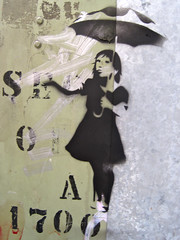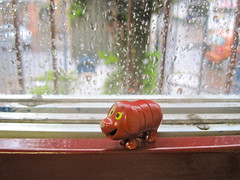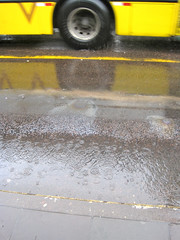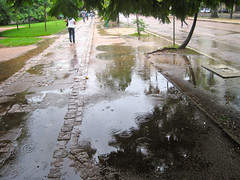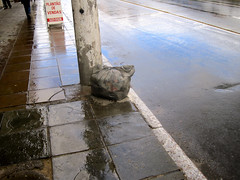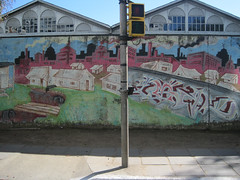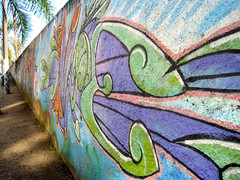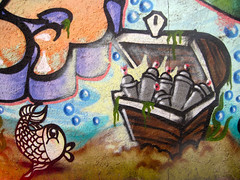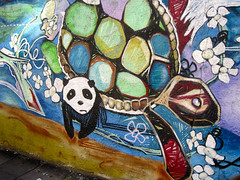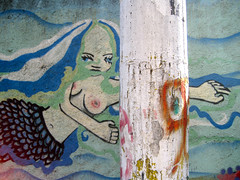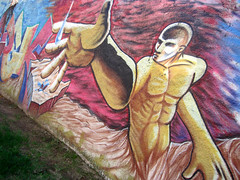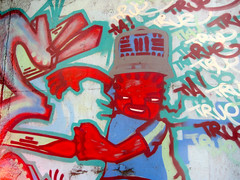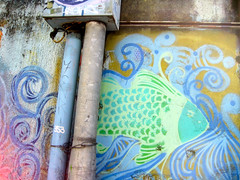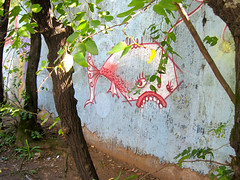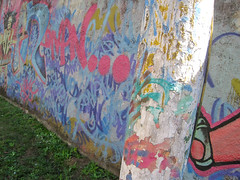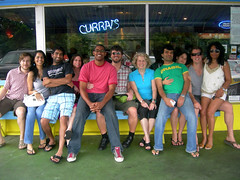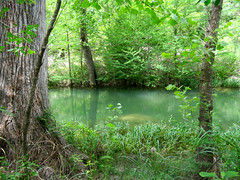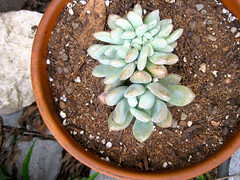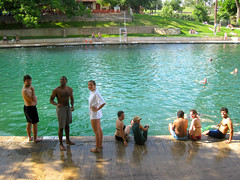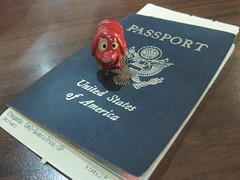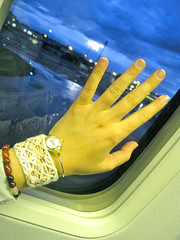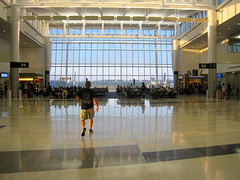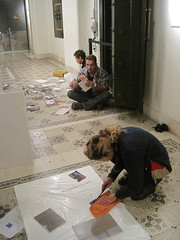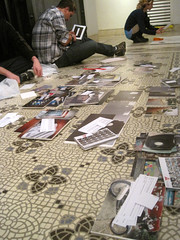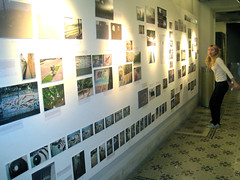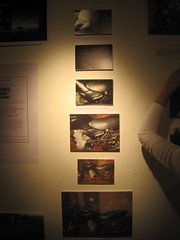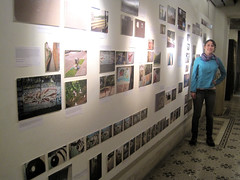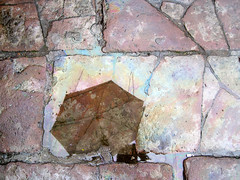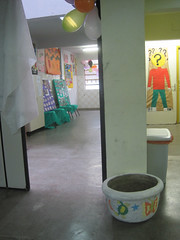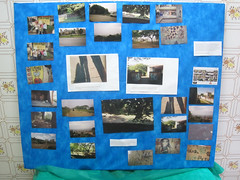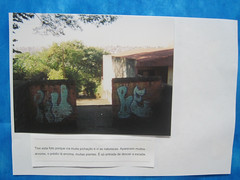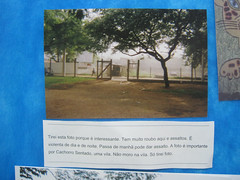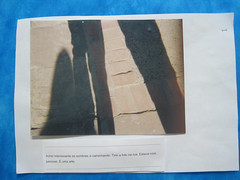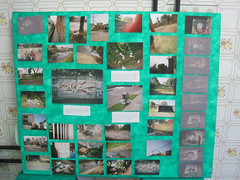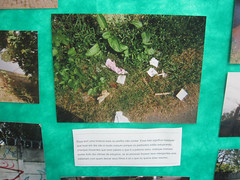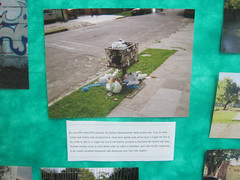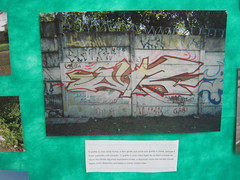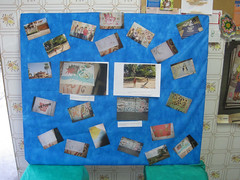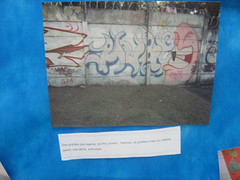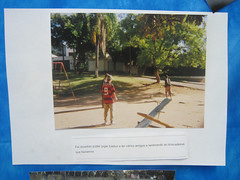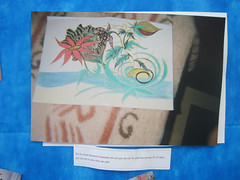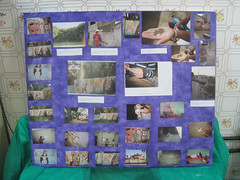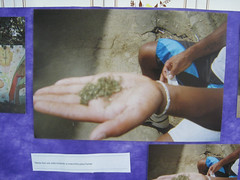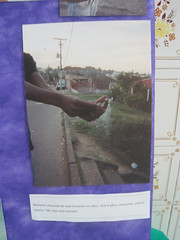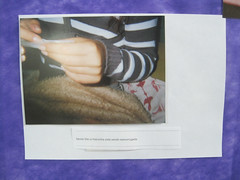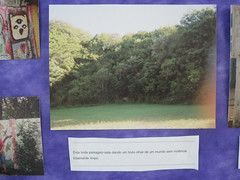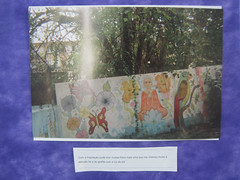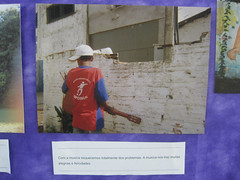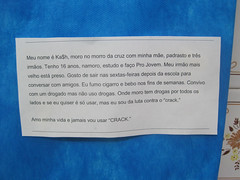Dear
Gilberto Gil,
I'd like to tell you about last Thursday, if you don't mind.
It was
one of the last days of my internships. I say "one" because the last "last" day keeps being postponed. And now Monday, the day before I fly back home to Texas, will be my
last day. I'll be hanging up
kid's photographs in
Santander Cultural, giving a presentation to a juvenile court judge about my impressions of the juvenile justice system here in Porto Alegre (!) and then hightailing it back to the Módulo Partenon for one last goodbye to the Pro Jovem Adolescente youth group.
Anyway.
G., one of the "social educators" at the Módulo Partenon, had asked me, "So you're leaving,
Libélua Azul? Tell me, did you get to spend much time in the communities?" And by "communities," he meant
vilas, aka the
neighborhoods that people are afraid of entering if they do not live in them.
And I said, "No, unfortunately. I visited one
vila briefly, but I haven't really been inside them."
"You have to," he said, "You can't leave here without doing this."
And so we made plans for him to take me on a quick "tour" on Thursday morning of the
vila Conceição where many of the center's clients reside. Of course Thursday morning was also officially my last morning with my supervisor, M. I was supposed to be with her during interviews with kids in conflict with the law complying with their juvenile probation. But, I thought it would be ok. I could give her my gift. We could chat. I could say goodbye to the kids I knew. And somewhere in there I could carve out a little time to go to the
vila.
Only that this Thursday morning was absolutely jam-packed with kids waiting to see M. Too many for her to be able to see them all. So, she asked me to meet separately with some of them.
I met with a few kids.
And there was one that I had never met before until now. I started asking him some basic questions about his life, who he lived with, what he liked to do, what he wanted to do in the future. These questions were really hard for him to answer. He squirmed even about what he liked to do. He stopped going to school years ago. He didn't work. At one point I asked him, if he'd ever tried drugs. He said yes, but just pot. How much did he smoke, I asked. Was it a lot? Like every day? He laughed. "So," I said, "You get up in the morning? Do you smoke then?" Yup. "And in the afternoon?" Yup. "And at night?" Yup.
I've never thought about marijuana as a very serious drug, but I gotta tell you when you meet kids who smoke it 24/7 and can't tell you what they like to do and can't tell you what they'd like to learn how to do, you start to wonder. Obviously, there's other things playing into this too, but marijuana is seriously helping them self-medicate and almost numb themselves to everything else. It's a survival mechanism I imagine, a way to continue existing through all the hard stuff that just doesn't go away. And it breaks my heart to see a youth without passion for life coursing through his/her veins.
He admitted to me that he didn't like talking, he didn't like conversing. I thanked him for putting this much effort into speaking with me, given that it wasn't easy for him. I asked him what he did to calm himself down, or what he did when he was feeling angry or upset? Did he have people to talk to? Nah, he said, what he did was smoke pot. His friends were okay, but then again, sometimes it sucked to be around them.
And I told him that in his next meetings with M. that she wouldn't be forcing him to talk. But, that perhaps he should start thinking about things that he likes to do, things that he might like to do, maybe even going back to school. Because these would be things that she'd bring up. These would be things that she could help him with. He nodded.
He left. I watched him walk away in his brand-name powder blue sweatshirt.
And in the end, there was a sliver of time for a "tour" of a
vila Conceição with G.
G. had grown up in this
vila and knew everyone there. He walked us around introducing us to everyone, to the cooks in the community kitchen, to the group of woman sharing
chimarrão on the sidewalk, to the drug dealers counting big wads of cash on street corners. By drug dealers, I mean young men, probably all under the age of 20. The views that this
vila had of the rest of the city were incredible. The colors of their houses were bright and cheerful. Dogs roamed the streets. Streets that were tight, but could sometimes fit a car.
Children played on their father's parked motorcycle making vroom-vroom sounds and giggling.
Laundry hung out in the sun.
A man in a wheelchair sat in the middle of a stone road.
A child dashed by.
G. pointed out a day-care center.
We came across a second group of drug dealers counting cash openly in a corner. The scent of marijuana wafting through the air.
Different dealers for different drugs.
G. introduced myself and E., the manager of the social service centers where I've been interning. And I saw the blue sweatshirt of the kid I'd been meeting with scarcely an hour earlier. He looked me in the eyes with a slightly startled, slightly bemused, yet subtle expression.
"
Oi," I said to all of them.
G. said that in the late afternoons, traffic picked up. There were lines of people waiting for drugs.
So, really that kid did work. Just not the kind of work that he wanted to tell me about.
G. took us to a memorial for a woman who had been murdered in a situation of domestic abuse. A spot with a plaque where people left offerings. A spot intended to speak out again the victimization of women. A spot overlooking the corrugated rooftops of the
vila houses and the tall buildings of the city in the distance.
And so we left. I think E. was crying.
"You don't have to be worried about danger when you're with me," said G.
"I could tell," I said, "I wasn't worried."
But that wasn't entirely true. There was this strange shiver that went through me, walking through that group of kids dealing drugs, our backs to them as we walked down a tight road. But feeling their strong presence behind us.
What I think what it was though was this feeling of wow, this is all so big. How do you begin? Here I am leaving. Here I am done with my internship. And everything I have seen is nothing. How do you work within a community for change? You can't just be on the outskirts. You have to be inside. But, how. And what do you do when dealing drugs is a more viable, lucrative alternative then going to school and getting stuck with a minimum wage job which pays you a barely livable salary that will get you nothing and nowhere. How do you work with this? How do I work with this back in Texas?
Scratching the surface, really. So many little steps to get anywhere. A moment of feeling utterly overwhelmed.
And in the late afternoon I was at a court proceeding. For a kid utterly enmeshed in the juvenile justice system for years now. A kid who keeps getting last chances. A kid who just got another last chance. And the question is, what will he do with it? Can he manage it? Or will he end up in kiddie prison for another year of his life? Sweet kid. I'd met him a few times when he'd been locked up. We hugged and kissed each other on the cheek, because that's what you do here. [Sidenote: I really appreciate the politics of touch here. They're so much more humane, so much more sensitive.] "This is the last time I'll see you," I said, "But, when I talk to my supervisor, V., I want to hear from her that everything is going great with you." He winked at me and nodded, "Ok," he said.
"
Tudo de bom," I said wishing him everything good in life.
And then I left. I ran out of the court house because I wanted to be done. Done for a little while. Waiting at the bus stop. Just being. Riding on a crowded bus. Just there. Not thinking. Because this is my life. This will be my life. No matter what, no matter who I'm working with. My life involves fervently believing that all of us have the right to discover our true potential and trying to build and be part of the community of people necessary to help individuals and communities find their true potential. And it involves strongly hoping that people can grab onto those little chances that life gives them and start finding that true potential. Some people unfortunately only get a few chances, unlike someone like me who practically gets served these chances on a silver platter...And it involves seeing all the times when this doesn't happen, when the chances don't come, or when, for whatever reason, people don't grab onto them. When life is unfair. Because life is most definitely unfair. And it involves continuing to hope and believe and struggle for something better.
...
So, Gilberto Gil, you're probably wondering what any of this has to do with you. It does, I promise.
You see on Thursday evening, my colleague and artist friend T. invited me to go see you perform at the
Brasil Rural Contemporâneo event going on downtown. Of course I accepted.
I was wearing painful shoes, but I hardly noticed. You were amazing. Simply amazing. I understand now why you are an icon. Your presence alone is fantastic.

And your music frees the soul just a little bit. I felt in love. I felt transported. And it was evident that the rest of the crowd felt the same way, as we swayed and danced and smiled and grinned and cheered and clapped and sang. I have no idea how the security guards, who had to stand with their backs to you, their eyes on the crowd, could do it.
Thank you Gilberto Gil, for the reminder that life is full of contradictions, at once searingly painful and unjust and at once painfully beautiful and full of so much goodness and love.
Obrigada,
Libélula Azul
